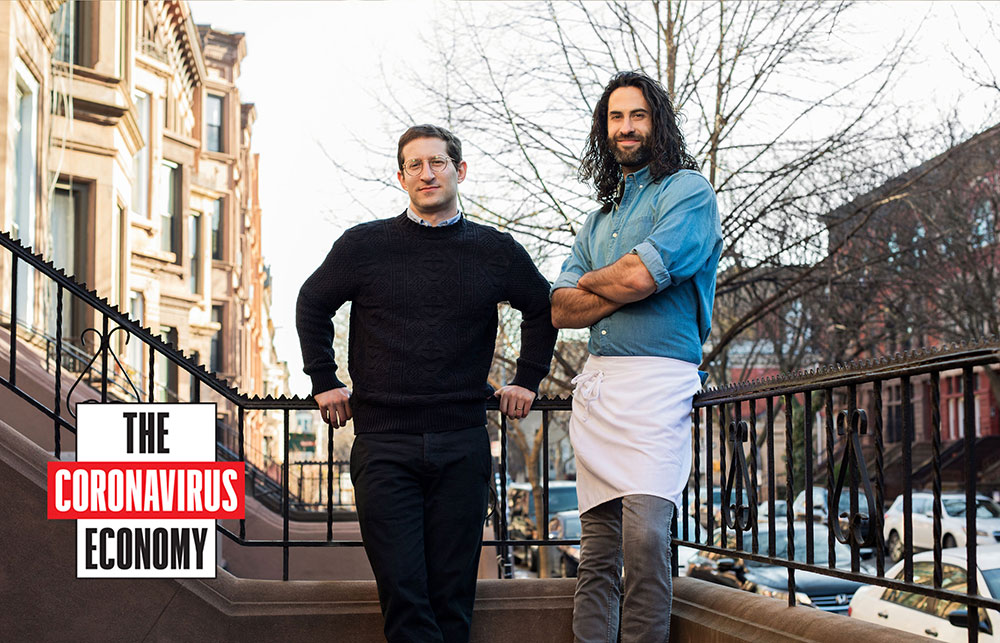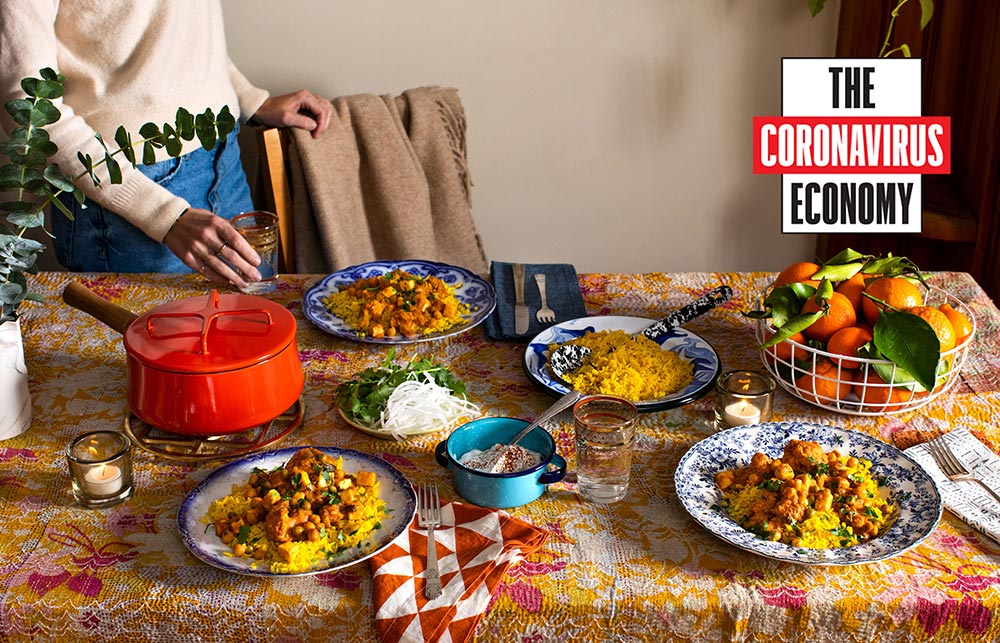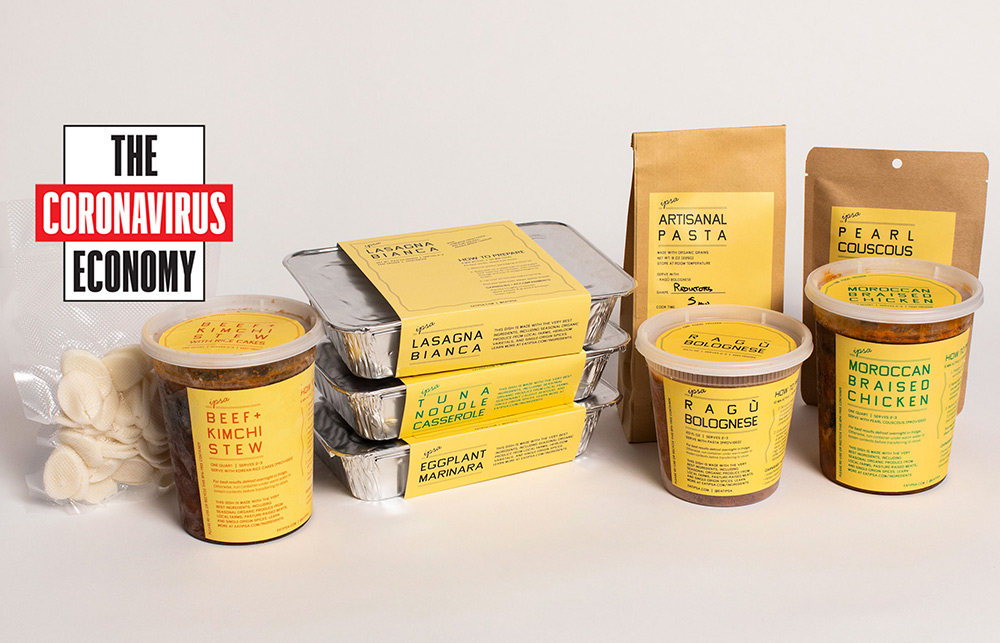在可以预见的未来,越来越多的顾客将会选择外带用餐,而这也将成为烹饪界迎来的最快变革之一。
《Zagat Future of Dining》本月发布的研究报告显示,90%的消费者每周外卖点餐至少1到2次,而在疫情发生前,这一数字为70%。虽然全美各地的餐馆已经缓步恢复营业,但食客们对堂食仍然多少有些顾虑。Zagat的研究发现,多数食客打算至少三至四周后再去餐馆吃饭,而在此之前他们将选择在家用餐。
现在,外卖的选择很多。由于许多消费者不想在超市大排场龙,越来越多的杂货店开始提供订餐服务,订餐选择也越发多样,许多商家的外卖销量也迎来了大幅增长。
Ipsa Provisions由来自线上订餐平台Blue Apron和Chipotle及多家高档餐厅的业内资深人士创办,其创立宗旨是打造“新型冷冻食品企业”。该公司所提供的餐品均在纽约市的一家小型商业厨房现场制作,包括鸡肉玉米饼汤、胡桃南瓜烤宽面条、椰子咖喱及牛肉泡菜炖菜等。
近期,《财富》杂志采访了Ipsa Provisions的联合创始人乔舒亚·布劳与米卡·弗雷德曼,询问了疫情对其工作和未来看法的影响,并了解了他们在过去几个月中如何管理自身情绪和财务状况。
为简明起见,以下采访内容有所删改。

《财富》:可以介绍下你们的背景么?创办Ipsa Provisions的原因是什么?
弗雷德曼:打小起我就是个美食爱好者。在耶鲁拿了不太实用的人文科学学士学位后,我给自己定了一个熟练掌握烹饪技巧的“五年计划”。为此,我在格雷梅西酒馆(Gramercy Tavern)、十一麦迪逊公园(Eleven Madison Park)的后厨工作过,也走遍了墨西哥和意大利,去过当地许多老奶奶家或高级或简陋的厨房。
乔舒亚对Ipsa的构想非常吸引我,我也很愿意接受这种挑战,与他一起重塑美国的冷冻食品行业。得益于自身的旅行经历和对餐厅厨房操作的了解,我对冷冻食品的可行性略知一二。我喜欢挑战,而改变人们的想法就是一件富有挑战性的工作,如果能用美食来实现这一目标就更是再好不过了。
布劳:我出生前,父母就已经在食品行业工作了。他们透过食物让我懂得了许多生活道理。往大了讲,几乎所有主要的全球问题都与粮食有着直接关联。往小了讲,食物与我们的生活也是息息相关。过去十年,我把大部分的时间都花在了打造更好的食品体系上,也是在那段时间,我越发确信,要想实现这一目标就绕不开 “吃什么”和“怎么吃”的问题。
话虽如此,其实之前我也没想到自己会主张对冷冻食品行业进行全面的重新审视。在女儿出生前,我们就预计到这个冬天会又冷又漫长,再加上考虑到家里会添一个新生儿,所以我花了大量的时间来准备吃的。我冻了很多妻子最喜欢吃的菜,这样想吃的时候就很方便了。家里冻的菜吃掉一部分之后,我就想着去杂货店买些差不多的来补充一下存货,但出乎我意料之外的是,找遍杂货店的冰柜也找不到相似的产品。
于是我联系了米卡,看他是否有兴趣跟我一起探索市场对这种食材考究、美味可口的冷冻食品是不是有需求。我们是老相识,而且我也一直很欣赏他的厨艺以及他对食物的理解。在最开始试运营时,我们希望能通过货真价实、分秒必争的贴心服务为客户提供最棒的家庭用餐体验,直至今日,这一目标仍然是Ipsa的核心愿景所在。

对许多消费者而言,杂货店的购物体验在过去几个月中发生了巨大变化。有些消费者可能已经转而采用预订或者外卖等方式来囤积一周的食材。疫情对Ipsa的市场需求有什么影响?
布劳:因为Ipsa刚开业四周就碰上了居家令,所以不太好区分疫情前后的需求变化。但开业后的这几个月,市场需求确实远超我们的预期。毫无疑问,这跟疫情有很大关系。
对食品行业而言,把在外面做好的食物或者半成品带回家中用餐一直是很少有人关心的边缘领域,而我们就是要提升这一领域的品质和档次,包括餐厅外卖、预加工食品、生鲜送餐,当然还有杂货店的冷冻食品。对食材有较高要求的客户越来越多,这个市场的规模也很大,但市场上缺乏能吸引这类人群的优质产品。一直以来,绝大多数情况下,我们都是在家用餐,像现在这么高的比例已经很多年没有过了。即便是喜欢做饭的人,也不会每顿饭都想自己做。

也有人担心食品配送的安全问题,一方面要避免新冠病毒通过食品包装传播,另一方面也要保护那些提供基本服务的工作人员。你们公司采取了哪些预防措施?疫情期间有没有什么变化?
弗雷德曼:“我是在纽约最顶级的一些餐馆接受的训练,所以从一开始,Ipsa的厨房就制定了非常严格的健康、安全和卫生标准。作为在那里工作过的年轻厨师,这些餐厅的高标准已经融进了我的灵魂之中。”
疫情期间,我们执行了更为严格的健康和安全标准。任何员工,只要出现了可疑症状,就会被要求待在家里。后厨员工到公司后会通过非接触式体温计测温,我们还给他们配备了用于更换的手套和口罩,供其在上班时使用。我们的厨房很大,所以厨师可以与同事保持适当的距离。交班前、后及上班期间都有受过专门训练的厨房维护人员对厨房进行清扫、消毒。我们还对厨房供货和物品接收、处理方法做了严格规定。配送人员和送货司机在上班时要穿戴适当的防护服,并且要求进行非接触式送货。
你觉得未来数周、数月消费者会怎么购买食品?有些地方已经取消了管制措施,外卖送餐的需求会不会继续增加?在这种经济环境中,Ipsa是否打算扩张自己的业务?
布劳:现在讨论人们的习惯在长期会产生多大变化还为时尚早。但毫无疑问,包括生鲜、快餐在内的各种外卖送餐服务将会在我们的日常工作中扮演更重要的角色。要想实现外卖送餐业务的可持续发展,食品企业需要重新思考自己的商业模式,这对很多公司来说都是一项挑战。
由于Ipsa独特的服务满足了当前这种特殊时期的需要,所以现阶段的潜在机遇比预期要多出许多。我们希望能实现有序、可控的增长,从而确保客户能够获得优质的体验。我们认为,现在关键是要打好运营基础,以支撑未来几年我们想看到的高速增长。
新冠疫情对你个人有什么影响,你过得怎样?
弗雷德曼:过去几个月的状态就像坐过山车——恐惧、悲伤、昂扬、孤独、困惑、希望还有绝望,一天之中你都会感受到。面对现阶段的不确定性,我很庆幸能有这样一份为人们提供食物的工作,一方面让我可以踏实下来,另一方面对我而言也是一种激励。
布劳:谢谢你的关心。和大多数人一样,我的心情也是起起伏伏的。有时也会感觉疲惫不堪。但有两件事最让我感到振奋:第一,在这样一个非常艰难的时期,Ipsa能让消费者吃得更好,过得更轻松。第二,我体验到了一种新的(谨慎)乐观心态。过去几个月中发生的一切,让我们意识到必须直面严峻的社会挑战。看到Ipsa已经开始行动,为推动早就该进行的结构性变革贡献着自己的力量,我感到很高兴。(财富中文网)
译者:Feb
在可以预见的未来,越来越多的顾客将会选择外带用餐,而这也将成为烹饪界迎来的最快变革之一。
《Zagat Future of Dining》本月发布的研究报告显示,90%的消费者每周外卖点餐至少1到2次,而在疫情发生前,这一数字为70%。虽然全美各地的餐馆已经缓步恢复营业,但食客们对堂食仍然多少有些顾虑。Zagat的研究发现,多数食客打算至少三至四周后再去餐馆吃饭,而在此之前他们将选择在家用餐。
现在,外卖的选择很多。由于许多消费者不想在超市大排场龙,越来越多的杂货店开始提供订餐服务,订餐选择也越发多样,许多商家的外卖销量也迎来了大幅增长。
Ipsa Provisions由来自线上订餐平台Blue Apron和Chipotle及多家高档餐厅的业内资深人士创办,其创立宗旨是打造“新型冷冻食品企业”。该公司所提供的餐品均在纽约市的一家小型商业厨房现场制作,包括鸡肉玉米饼汤、胡桃南瓜烤宽面条、椰子咖喱及牛肉泡菜炖菜等。
近期,《财富》杂志采访了Ipsa Provisions的联合创始人乔舒亚·布劳与米卡·弗雷德曼,询问了疫情对其工作和未来看法的影响,并了解了他们在过去几个月中如何管理自身情绪和财务状况。
为简明起见,以下采访内容有所删改。
《财富》:可以介绍下你们的背景么?创办Ipsa Provisions的原因是什么?
弗雷德曼:打小起我就是个美食爱好者。在耶鲁拿了不太实用的人文科学学士学位后,我给自己定了一个熟练掌握烹饪技巧的“五年计划”。为此,我在格雷梅西酒馆(Gramercy Tavern)、十一麦迪逊公园(Eleven Madison Park)的后厨工作过,也走遍了墨西哥和意大利,去过当地许多老奶奶家或高级或简陋的厨房。
乔舒亚对Ipsa的构想非常吸引我,我也很愿意接受这种挑战,与他一起重塑美国的冷冻食品行业。得益于自身的旅行经历和对餐厅厨房操作的了解,我对冷冻食品的可行性略知一二。我喜欢挑战,而改变人们的想法就是一件富有挑战性的工作,如果能用美食来实现这一目标就更是再好不过了。
布劳:我出生前,父母就已经在食品行业工作了。他们透过食物让我懂得了许多生活道理。往大了讲,几乎所有主要的全球问题都与粮食有着直接关联。往小了讲,食物与我们的生活也是息息相关。过去十年,我把大部分的时间都花在了打造更好的食品体系上,也是在那段时间,我越发确信,要想实现这一目标就绕不开 “吃什么”和“怎么吃”的问题。
话虽如此,其实之前我也没想到自己会主张对冷冻食品行业进行全面的重新审视。在女儿出生前,我们就预计到这个冬天会又冷又漫长,再加上考虑到家里会添一个新生儿,所以我花了大量的时间来准备吃的。我冻了很多妻子最喜欢吃的菜,这样想吃的时候就很方便了。家里冻的菜吃掉一部分之后,我就想着去杂货店买些差不多的来补充一下存货,但出乎我意料之外的是,找遍杂货店的冰柜也找不到相似的产品。
于是我联系了米卡,看他是否有兴趣跟我一起探索市场对这种食材考究、美味可口的冷冻食品是不是有需求。我们是老相识,而且我也一直很欣赏他的厨艺以及他对食物的理解。在最开始试运营时,我们希望能通过货真价实、分秒必争的贴心服务为客户提供最棒的家庭用餐体验,直至今日,这一目标仍然是Ipsa的核心愿景所在。
对许多消费者而言,杂货店的购物体验在过去几个月中发生了巨大变化。有些消费者可能已经转而采用预订或者外卖等方式来囤积一周的食材。疫情对Ipsa的市场需求有什么影响?
布劳:因为Ipsa刚开业四周就碰上了居家令,所以不太好区分疫情前后的需求变化。但开业后的这几个月,市场需求确实远超我们的预期。毫无疑问,这跟疫情有很大关系。
对食品行业而言,把在外面做好的食物或者半成品带回家中用餐一直是很少有人关心的边缘领域,而我们就是要提升这一领域的品质和档次,包括餐厅外卖、预加工食品、生鲜送餐,当然还有杂货店的冷冻食品。对食材有较高要求的客户越来越多,这个市场的规模也很大,但市场上缺乏能吸引这类人群的优质产品。一直以来,绝大多数情况下,我们都是在家用餐,像现在这么高的比例已经很多年没有过了。即便是喜欢做饭的人,也不会每顿饭都想自己做。
也有人担心食品配送的安全问题,一方面要避免新冠病毒通过食品包装传播,另一方面也要保护那些提供基本服务的工作人员。你们公司采取了哪些预防措施?疫情期间有没有什么变化?
弗雷德曼:“我是在纽约最顶级的一些餐馆接受的训练,所以从一开始,Ipsa的厨房就制定了非常严格的健康、安全和卫生标准。作为在那里工作过的年轻厨师,这些餐厅的高标准已经融进了我的灵魂之中。”
疫情期间,我们执行了更为严格的健康和安全标准。任何员工,只要出现了可疑症状,就会被要求待在家里。后厨员工到公司后会通过非接触式体温计测温,我们还给他们配备了用于更换的手套和口罩,供其在上班时使用。我们的厨房很大,所以厨师可以与同事保持适当的距离。交班前、后及上班期间都有受过专门训练的厨房维护人员对厨房进行清扫、消毒。我们还对厨房供货和物品接收、处理方法做了严格规定。配送人员和送货司机在上班时要穿戴适当的防护服,并且要求进行非接触式送货。
你觉得未来数周、数月消费者会怎么购买食品?有些地方已经取消了管制措施,外卖送餐的需求会不会继续增加?在这种经济环境中,Ipsa是否打算扩张自己的业务?
布劳:现在讨论人们的习惯在长期会产生多大变化还为时尚早。但毫无疑问,包括生鲜、快餐在内的各种外卖送餐服务将会在我们的日常工作中扮演更重要的角色。要想实现外卖送餐业务的可持续发展,食品企业需要重新思考自己的商业模式,这对很多公司来说都是一项挑战。
由于Ipsa独特的服务满足了当前这种特殊时期的需要,所以现阶段的潜在机遇比预期要多出许多。我们希望能实现有序、可控的增长,从而确保客户能够获得优质的体验。我们认为,现在关键是要打好运营基础,以支撑未来几年我们想看到的高速增长。
新冠疫情对你个人有什么影响,你过得怎样?
弗雷德曼:过去几个月的状态就像坐过山车——恐惧、悲伤、昂扬、孤独、困惑、希望还有绝望,一天之中你都会感受到。面对现阶段的不确定性,我很庆幸能有这样一份为人们提供食物的工作,一方面让我可以踏实下来,另一方面对我而言也是一种激励。
布劳:谢谢你的关心。和大多数人一样,我的心情也是起起伏伏的。有时也会感觉疲惫不堪。但有两件事最让我感到振奋:第一,在这样一个非常艰难的时期,Ipsa能让消费者吃得更好,过得更轻松。第二,我体验到了一种新的(谨慎)乐观心态。过去几个月中发生的一切,让我们意识到必须直面严峻的社会挑战。看到Ipsa已经开始行动,为推动早就该进行的结构性变革贡献着自己的力量,我感到很高兴。(财富中文网)
译者:Feb
For the culinary world, one of the most rapid transformations that looks as if it will hold for the foreseeable future is that customers are ordering takeout more than ever.
Nine in 10 consumers are ordering takeout (as opposed to seven in 10 before the pandemic) at least one to two times per week, according to the Zagat Future of Dining study published this month. And as restaurants slowly begin to reopen across the country, diners remain wary of going back. Zagat found most diners plan to wait at least three to four weeks before returning to restaurants, opting instead for more meals at home.
But not all takeout is one and the same. There are more and more grocery and meal subscription kits available, many of which are surging in sales as consumers shy away from long lines at supermarkets.
Founded by veterans of Blue Apron, Chipotle, and upscale restaurants, Ipsa Provisions aims to be a “new kind of frozen food company.” Meals are made from scratch in a small commercial kitchen in New York City, with menu items such as chicken tortilla soup, a butternut squash lasagna, coconut curry, and beef and kimchi stew.
Fortune spoke with cofounders Joshua Brau and Micah Fredman for a new series, The Coronavirus Economy, about how the outbreak has affected their business, their thoughts on the future, and how they have been handling these past fraught few months, both emotionally and financially.
The following interview has been lightly edited and condensed for clarity.
Fortune: Could you tell me a little bit about your background? What inspired the launch of Ipsa Provisions?
Fredman: I’ve loved food for as long as I can remember. After receiving a rather impractical BA in Humanities from Yale, my five-year plan—to master the craft of cooking—took me through the kitchens of Gramercy Tavern, Eleven Madison Park, and a number of humbler and wiser kitchens of grandmothers throughout Mexico and Italy.
When Josh approached me to pilot the Ipsa concept, I was enthralled by the challenge of redeeming the American freezer. My travels and knowledge of restaurant kitchen operations had shown me glimpses of the freezer’s possibilities. I love an underdog. I love the challenge of changing people’s minds, and deliciousness is my favorite way of doing it.
Brau: Both of my parents have been in the food industry since before I was born. They helped me see so much of life through the lens of food. On a macro level, there are direct linkages between the food and just about every major global issue. And at the micro level, food obviously plays an essential role in so many aspects of our lives. I’ve spent the better part of the last decade working to build a better food system, and over that time I’ve become convinced that doing so requires rethinking how and what we eat at home.
That said, I never expected I’d be advocating for a wholesale rethinking of the freezer. Before my daughter was born, I spent a good amount of time cooking and freezing large batches of some of my wife’s favorite dishes so we’d have them ready to go during what we correctly predicted was a long cold winter with a newborn. As our homemade stash dwindled, I was surprised to find that I couldn’t find anything comparable in grocery store freezer aisles.
So I approached Micah to see if he was interested in exploring whether there was a market for seriously tasty frozen food made with superb ingredients. Micah and I had known each other for a long time, and I always admired his cooking and his approach to food more broadly. The early pilots we ran aspired to accomplish something that remains at the core of our vision for Ipsa: to deliver an experience that is—dollar-for-dollar and minute-for-minute of active effort—the best meal you can put on your table at home.
For many consumers, grocery shopping has changed dramatically over the past few months. Some consumers might be turning to alternative services, like subscription and delivery programs, to stock up on food and meals for the week. How has demand for Ipsa fared since the onset of the pandemic?
Brau: It’s difficult to untangle demand before and after the onset of the pandemic because we launched Ipsa about four weeks before stay-at-home orders were put in place. What we have seen is demand for our food that far exceeds what we expected for our first few months in operation. There’s no question the pandemic has a lot to do with that.
Our concept is focused on elevating what has been a fairly lackluster corner of the food industry: meals that are eaten at home, but cooked partially or entirely outside of it. This includes restaurant takeout, prepared foods, fresh meal delivery services, and of course, the grocery store frozen food aisle. Despite the massive size of this market, there’s very little out there that’s compelling to the growing ranks of people who want to eat really well all the time. It’s always been the case that the vast majority of meals are eaten at home, but that proportion is as high now as it’s been in a very, very long time. Even people who love to cook don’t want to cook every single meal.
There have been some concerns about the safety of food delivery—not only of preventing the transmission of COVID-19 via food packaging but also protecting employees who are providing an essential service. What kind of precautions has your business set up, and have any of those changed during the pandemic?
Fredman: I trained at some of New York’s finest restaurants, so Ipsa’s kitchen standards for health, safety, and cleanliness were rigorous from the start. These restaurants instill high standards into the core of your being as a young chef.
Operating during the pandemic, our health and safety protocols have only become more stringent. Any employee that experienced any hint of a possible symptom was asked to stay home. Our kitchen employees are scanned with a noncontact thermometer upon arrival and provided with gloves (changed frequently) and face masks for use during their shifts. Our kitchen is spacious enough that cooks are able to maintain appropriate distance from colleagues. The kitchen is sanitized by a trained kitchen maintenance person before, during, and after each shift. Strict protocols govern how deliveries are made to the kitchen and how staff treat items when they are received. Fulfillment staff and delivery drivers wear appropriate protective gear during their shifts, and noncontact delivery is our standard.
Looking toward the next few weeks and months, how do you expect consumers will continue to shop for food? Do you expect more interest in delivered meals, even as restrictions lift in some areas? And does Ipsa plan to expand in this economic climate?
Brau: It’s too early to tell how dramatically habits will shift in the long run. But there’s no question that delivered food—groceries, meals, et cetera—will figure more prominently in our routines. The challenge for many food businesses will be to rethink their business models so the economics of delivery are sustainable.
Given the unique ways in which Ipsa’s offering is suited to this particular moment, we’re facing more potential avenues for expansion than we anticipated at this stage of the business. We’re focused on growing intentionally, so we can maintain the quality of the experience we deliver to our customers. We believe it’s critical to build an operational foundation now that can sustain the more aggressive growth we’d like to see in the coming years.
On a personal note, how have you been faring amid all this?
Fredman: These past couple months have been quite the mental-emotional roller coaster—fear, sorrow, drive, loneliness, confusion, hope, and hopelessness—all in the course of a day. I am incredibly grateful to have had this work of feeding people to both ground and propel me amidst all the uncertainty.
Brau: Thank you for asking. Like most people, I experience ups and downs. Sometimes I’m exhausted. But more than anything I’m energized by two things: first, the simple fact that Ipsa is helping make things a little easier and a little more delicious for our customers during a very difficult period in their lives. Second, I’m experiencing a newfound—albeit cautious—optimism. The events of the last few months have made it impossible to ignore the depth of the challenges we face as a society, and I’m excited to see Ipsa participate in any way we can, large or small, to help bring about structural changes that are long overdue.






